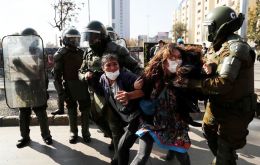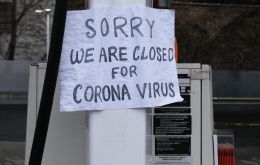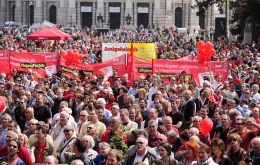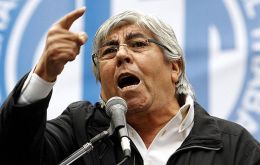MercoPress. South Atlantic News Agency
Tag: Workers Day
-
Friday, May 2nd 2025 - 09:53 UTC
Uruguayan Labor Minister recalls the Chicago workers' protests

Uruguayan Labor Minister Juan Castillo Thursday underlined the need to debate reducing working hours to improve quality of life, social justice, and equality. During his Workers' Day speech broadcast on national radio and television, he recounted the historical significance of the date, referencing the Chicago workers' protests for an eight-hour workday, which led to violent repression and the prosecution of union leaders. Castillo also highlighted his country's labor milestones, including the 1915 law establishing the eight-hour workday and its 2008 extension to rural and domestic workers.
-
Thursday, May 1st 2025 - 10:59 UTC
Workers' Day highlights ongoing challenges and digital shifts in Latin America

As the world marks International Workers' Day on May 1st, Latin America reflects not only on the hard-won labor rights of the past but also on the urgent challenges of the digital age. Born from the 1886 Chicago protests demanding an eight-hour workday, the holiday honors the legacy of the “Haymarket Martyrs” and remains a symbol of the global struggle for fair labor conditions.
-
Saturday, May 2nd 2020 - 07:26 UTC
Chilean police arrested dozens protestors during May Day demonstration

Chilean police on Friday arrested dozens of people, including press photographers, when they broke up a May Day demonstration in the capital Santiago. Demonstrators had gathered in the city's Plaza Italia in defiance of a government prohibition on public gatherings of more than 50 people as part of measures against the coronavirus.
-
Friday, May 1st 2020 - 08:12 UTC
International Workers Day message from ILO Director General

By Guy Ryder (*) – In the time of coronavirus, the big challenge for most of us is how to protect ourselves and our families from the virus and how to hold on to our jobs. For policymakers, that translates into beating the pandemic without doing irreversible damage to the economy in the process.
-
Monday, April 30th 2018 - 08:36 UTC
“It’s Time to Change the Rules”, ITUC May Day Statement 2018

One hundred and fifty years ago, workers in Britain came together to create the world’s first national trade union centre, the TUC, in the city of Manchester. They, and working people in many other places at that time, laid the first foundations for the global trade union movement of today, more than 200 million strong. Ever since those early steps, men and women organizing together have built and grown their unions and changed the course of history.
-
Monday, May 2nd 2016 - 05:42 UTC
Rousseff pledges “to fight to the end” and some groups anticipate “civil disobedience”

Brazil's populist president Dilma Rousseff vowed at a protest on Sunday, International Labour Day, that she would go down fighting ahead of what could be her final full week in power before impeachment.
-
Saturday, April 30th 2016 - 12:12 UTC
Argentine unions take to the streets to protest job cuts and inflation

Argentina’s strongest unions brought thousands of people into the streets Friday to protest high inflation and job cuts in the biggest demonstrations against President Mauricio Macri since he took office in December. Demonstrators waving blue and white Argentine flags flooded the main avenues of Buenos Aires, blocking traffic in a protest that brought together rival unions that put aside differences to protest Macri’s policies.
-
Saturday, April 30th 2011 - 10:03 UTC
Moyano calls for CFK re-election and wants a finger in companies and Congress

Argentina's powerful organized labour leader Hugo Moyano called for President Cristina Fernandez, CFK, to run for re-election but also asked for greater labour participation in the ballot lists, sharing companies’ profits and seats in the boards of the main corporations.
